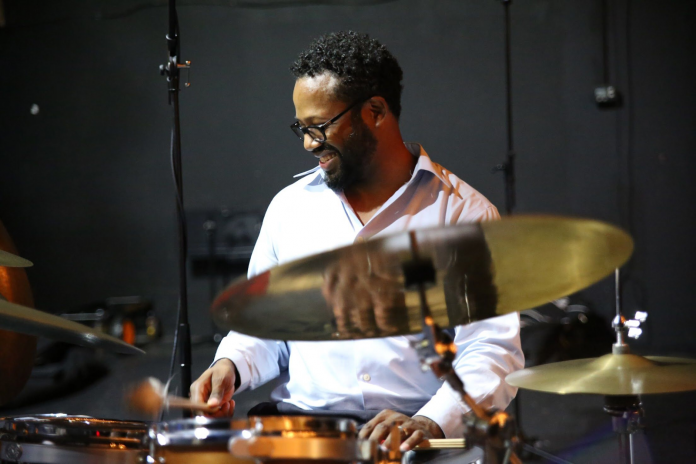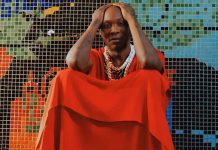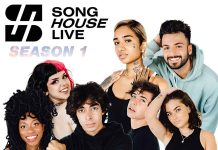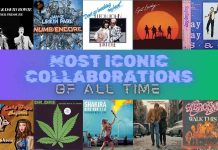Critically-acclaimed Ohio composer, Dr. Mark Lomax II announced back in May that he would be releasing a new educational and multi-disciplinary curriculum that helps students enhance the understanding of Afrikan history. Throughout Dr. Lomax’s career, he has released a total of 40 albums, harmonizing jazz, classical, and gospel music.
However, in recent years, he has sought to create work that stimulates the consciousness and sparks conversation. In partnership with co-authors Dr. Melissa Crum, diversity and equity practitioner in Columbus and the founder of Mosaic Education Network, and Deva Rashed-Boone, a Columbus-based writer and educator, the curriculum builds upon Dr. Lomax’s groundbreaking 2019 musical composition and life’s work, 400: An Afrikan Epic, in-text and storytelling form. He has been collaborating with the Cincinnati Symphony Orchestra in helping share his work.
The composition was originally released as a 12-album cycle with over 8.5 hours of music, composed of soul-moving sounds of drums, strings, woodwinds, and piano. Think of it as the “Baraka” of Afrikan history. And if you haven’t seen Baraka, when you’re done reading this piece, go stream it; it’s a definite must-see!
The new curriculum helps expand the student’s understanding of Afrikan history and takes a holistic look at the triumphs and falls of the Afrikan people, from pre-colonial Afrika to Afro-Futurism. Specifically, the materials bring readers into the culture and progression of Afrikan people from the continent’s pre-colonial history, the Black Holocaust and trauma during the diaspora, and conceptualizing a future, forthcoming Afrkikan experience beyond 2020.
If we were to look back at 2020, how would we describe it? Surely, the answers to this question would differ depending on the person, group of people, and/or industry you ask.
Right now, the controversy surrounding racial equality in America is so pressing that it has placed the very foundation of law enforcement and our U.S. Constitution under heavy scrutiny, from every industry.
Most of 2020 has fueled powerful, legitimate movements like Black Lives Matter (BLM), which stand for racial equality.
However, these movements have also birthed weaponized, bastardized doppelgangers, which have become violent and fatal to our country, lending energy to extremist groups like the Proud Boys, who recently heard the horrific marching order from the U.S. President Donald Trump to “stand down and stand by” when asked if we would condemn white supremacy by Debate 2020 moderator, Chris Wallace.
A Debate or Rodeo? What Our Country Needs Now More Than Ever…
After witnessing what could only be described as a rodeo show for the first round of the 2020 Presidential Debate in Ohio, our country needs to take action to continue recognizing and empowering Black America, following the horrific murder of Breonna Taylor.
Black America needs a voice and needs a leader to help guide our country’s youth on a journey through Afrikan roots.
“The debate between #45 and Joe Biden is a debate between overt racism and ‘normal’ racism,” Dr. Lomax exclaimed, adding that “both exploit Black America, but one is simply ‘nicer’ about it.”
We also asked Dr. Lomax how he would describe the first round of the 2020 Presidential Debate in under 5 words:
“The debate exacerbated America’s trauma.”
On Friday, the Commission on Presidential Debates announced that it would be canceling the second presidential debate after President Trump declined to participate in the “virtual” debate, despite concerns over his recent COVID-19 diagnosis.
We spoke with Dr. Lomax II, on why his ongoing mission to provoke critical thinking and provide a holistic, global perspective on Afrikan roots and culture is what our country needs right now.
MIW: What do you think Black America took away from the first round of the Trump/Biden debate?
ML: It depends on what aspect of Black America you are looking at. There is a small number of us who support #45 (the six percent who voted for him in 2016). There is a component of us for whom the debate is useless because we’ve already decided #45 has got to go. Then there are those who are completely checked out because our lives will be the same no matter who is president. Our differences not-withstanding, we all know who the candidates are and I’m willing to wager that none of us were surprised.
MIW: How would you inject our current political climate into your curriculum, now having seen the first round of the 2020 Presidential debate?
ML: We created the 400: An Afrikan Epic Curriculum Guide exactly because of the cultural values that begat people like #45, and make people like Biden seem as though they are some sort of hero. A better grasp of history improves our ability to understand the present and gives us the requisite power to create a better future. That is the purpose of the curriculum.
MIW: Let’s talk about the new curriculum. How long did it take to put together?
ML: 400: An Afrikan Epic is a 12-album musical cycle celebrating the resilience, strength, brilliance and beauty of Afrikans in America and the diaspora. Released in 2019, the cycle was composed in commemoration of the 400 years since the first “20 and odd” Afrikans were brought to America. It covers pre-colonial Afrikan history, the 400 years of the Ma’afa (1619- the present), and artistically projects 400 years into the future when humanity has become healthy, happy, and whole again.
The idea for the curriculum has been rattling around in my head for years. As I began composing the 400 in 2016, I knew there needed to be an educational component to inform the conversations I hoped the music would catalyze toward reimagining America and the world from a human-centered perspective.
After several conversations with my friend, educator, and scholar, Dr. Melissa Crum, I gave her my notes and she did a fantastic job creating a learning tool that can be used by people of diverse age groups and ethnic backgrounds. The curriculum was developed over the course of a year and follows the structure of the musical cycle. It contains historical overviews, definitions, discussion questions, over 100 scholarly references, and is designed to help learners explore and contemplate the complexities of an enduring history of Afrikans before and during their presence in the Americas.
MIW: Wow! Looking back, what would you consider to be the most challenging aspect of putting 400 together?
ML: The most challenging aspect of putting the curriculum together had to do with creating a document that could be used by the widest scope of learners possible. Thinking within the conceptual framework of the Dogon (giri so, benne so, bolo so, so dayi), we strove to build a tool that meets the learner where they are (giri so), and provides additional resources to facilitate deeper learning (so dayi, or clear word and vision). An educator can use this resource with their k-12 students, I have used it with my college students and it has been used by several community study groups. That was a challenge.
If You’re Listening, Seek to Understand…
For students approaching Dr. Lomax’s curriculum or even listeners wanting to take in all that 400 is, Dr. Lomax hopes that by having the music and curriculum work in tandem, the listener/learner’s understanding is deepened.
“…this is a part of world history that is often marginalized at best, and more often erased from mainstream curricula. Much of why things haven’t changed as much as we’d like, is because we often seek solutions without a full understanding of the problem. The 400 curriculum is a resource to bring greater context to the present, increasing the agency of those who seek change to create a new and better future.”
MIW: Why does our music industry need to listen now more than ever to Black America, and to join the cause in helping educate our youth?
ML: America has always, ALWAYS exploited Black talent. If anyone wants to save the soul of this country, they should be listening to Black America at large, but especially Black women! We are the most humane people in this country because we have endured and given the most, all while receiving the least in return.
If you use a smartphone, thank Dr. Henry T. Sampson.
High-speed internet? Thank Dr. Shirley Jackson.
Ever read a book after sunset? Thank Lewis Latimer for inventing the carbon filament.
Home security system? Marie Ban Brittan Brown invented the closed-circuit television security system.
Do you like good music? Thank enslaved Afrikans for inventing the Spirituals and the Blues from which we’ve derived rock, funk, hip hop, R&B, soul, gospel, electronica, and everything else. The great Max Roach said American music would be Lawrence Welk without Black music. You’re welcome!
Further, it was the “jazz” music of the 40s, the soul music of the 50s and 60s, and hip hop since the late 80s that has brought people together. That’s why the industry tried to keep even the music segregated on race records in the earlier part of the 20th century.
The music industry knows the power of Black music and IF it wants to be part of creating a more just and equitable society, then it should use its power to elevate the voices of unity. Black voices. Not the corporate constructs that dwell in base vibrational frequencies, promoting behaviors and outcomes that definitely have a place in the culture, but shouldn’t be front and center.
I’m focusing on the Black voices that elevate the Human Spirit and encourage listeners to be about the work of being better and doing better. This is how we let our young people know we value them, by producing art and entertainment that lifts them up and makes it hip to love themselves and each other.
Remembering Breonna Taylor and Those Lives Horrifically Lost
In memory of Breonna Taylor, Dr. Lomax shared that he has already honored Taylor and other Ankhcestors in recent works of his.
“I’ve honored Breonna and other Ankhcestors already in recent works, such as in my Drumversations Livestream for her birthday (Substance vs. Spectacle, aired June 5, 2020), and in a recent solo performance of my 2014 #BLM album (Johnstone Fund for New Music, broadcast via Facebook July 12, 2020).
I’m also doing research for my next large work. It’s an oratorio for my Afro-chamber Ensemble called Reconstruction and the Nadir. It will be narrated by Ankhcestral voices who are telling the story to those recently slain as a result of state-sanctioned violence. Breonna will be included in that work.”
MIW: How does the power of your sound resonate with listeners?
ML: Cymatics is an area of physics that focuses on understanding how sound affects the physical world. We know that different vibratory frequencies impact the body in various ways. There is also evidence that the intention behind the sound, that is an infusion of spiritual energy into the sounds being made, can also have an impact on the listener (see the research of Dr. Masaru Emoto and Dr. Hans Jenny).
That being said, I know that music impacts listeners psychologically, physiologically, and spiritually. My hope is that the music my ensembles and I make resonates with listeners as a result of the quality of the sounds vibrating in and around their bodies and that the intentions infused in the music I compose serve as a means to heal and repair spiritual bodies that are under constant attack from anti-human forces.
We are one Human family, and that’s the fundamental message I hope resonates with those who choose to engage my work.
Global Pandemic, Or Not…
Ten months into COVID-19 and what seems to be no end in sight, Dr. Lomax’s ability to produce his unique sound has certainly changed.
“As a result of COVID, I am no longer able to perform with my ensemble,” he says. “I have been broadcasting a weekly livestream on YouTube every Friday at noon, where I discuss my thoughts on how we create a better world and play music for solo drum set. I’ve also been fortunate to have several commissions, and have recently completed a documentary filmed during the creation and premiere of 400: An Afrikan Epic.”
But that being said, Dr. Lomax’s “mission, vision, and artistic values remain the same,” as his goal has “always been to create artistic products that uplift and entertain.”
Lomax, who teaches at The Ohio State University, considers himself “a Jali, who is an educator, activist, composer, and drummer.”
Personal branding is important today, especially in what we hope to be a post-COVID-19 2021. As for Dr. Lomax, the challenge he faces with his personal brand revolves around how those “different aspects of those identities are leveraged, more or less, in the various environments [he] finds himself in.” He emphasizes that he works “very hard to avoid the limitation of ‘boxes’”.
“I teach at The Ohio State University, work in philanthropy for a community foundation, compose work in a wide range of musical styles, create educational content, give lectures, and perform in various ensembles under my leadership from solo to large chamber ensembles. That’s often hard for industry folks to process, but my creative disposition takes precedent over the simplistic commercial marketability imposed on artists by executives who are more concerned with capitalistic pursuits. Maybe that is something the music industry should work to better understand in this climate. The best way to affect change is to support the ARTISTS who are engaging the world in multifaceted ways and who are using their art to inspire and create a more beautiful world.”
Dr. Lomax has graciously provided readers here with two tracks from the 400 suite, to give readers and listeners a taste of what he hopes to embed in each of our minds. Please feel free to listen below:








